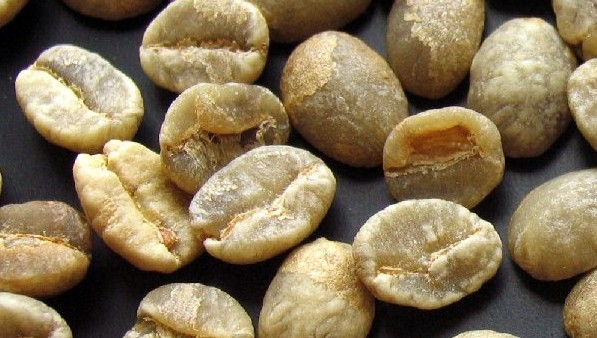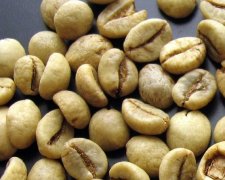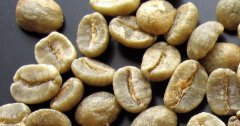Well-known coffee raw beans introduce Kenyan coffee raw beans
Kenya AA Green Bean
Coffee arrived in Kenya in the 19th century, when Ethiopian coffee drinks were imported to Kenya via South Yemen. But it wasn't until the early 20th century that bourbon coffee trees were introduced by the St. Austin Mission. Kenyan coffee is mostly grown at altitudes of 1,500 to 2,100 meters and harvested twice a year. To make sure only ripe berries are picked, people have to make about seven rounds through the woods. Kenyan coffee is grown by smallholders who harvest the coffee and send it fresh to a cooperative washing station, which sends the washed and dried coffee to the cooperative in the state of "parchment beans"(i.e. beans covered with an endocarp)("parchment beans" are the final state of the beans before peeling). All coffee is collected together and growers charge an average price based on its actual quality. This method of buying and selling generally works well and is fair to both growers and consumers.
Kenya's coffee is grown near Mount Kenya in the middle and is sometimes named after the capital Nairobi to ensure its quality. Here beans are graded according to size, the largest is AA, then A and B, etc., and have nothing to do with the origin, so the same AA beans, quality and characteristics may vary greatly. Except for Yemen and Ethiopia's dry mocha, most coffee on the continent is washed. With state support, Kenya's washed arabica beans are of high average quality and are handled with considerable care. Good Kenyan beans not only have the same strong acid as mocha, stimulate the sides of the tongue, it even has mocha lack of rich texture, in African coffee, it can brew a balanced drink. The Kenyan government takes the coffee industry extremely seriously, and it is illegal to cut down or destroy coffee trees here.
Kenya's coffee buyers are world-class buyers of premium coffee, and no country grows, produces and sells coffee as consistently as Kenya. All coffee beans are first acquired by the Coffee Board of Kaeya (CBK), where they are appraised, graded and then sold at weekly auctions, where they are no longer graded. The Kenya Coffee Board acts only as an agent, collecting coffee samples and distributing them to buyers so that they can determine price and quality. Nairobi auctions are held for private exporters and the Kenya Coffee Board pays growers below-market prices.
The best coffee grade is Pea Berry Coffee (PB), followed by AA++, AA+, AA, AB, etc., in that order. Fine coffee is shiny, delicious and slightly aromatic. Coffee professionals consider Kenyan coffee to be one of their favorite products because Kenyan coffee contains every feeling we want from a good cup of coffee. It has a wonderful, satisfying aroma, balanced acidity, well-proportioned particles and excellent fruity notes. Baking method: Deep taste: Strong acid and fragrant, especially praised by "Kenya AA".

Important Notice :
前街咖啡 FrontStreet Coffee has moved to new addredd:
FrontStreet Coffee Address: 315,Donghua East Road,GuangZhou
Tel:020 38364473
- Prev

Indonesia Java Robusta Green Beans
Indonesia Java robusta green bean In the early 1970s Java cut down most of the Arabica trees introduced by the Dutch and planted robusta beans instead. Since then Java coffee has become greasy, bland and has a strong smell of wheat tea. Of the few remaining Arabica estates, Djampit is the most famous.
- Next

Introduction to Colombian Coffee Raw Bean
Columbia Coffee Raw Bean Colombia coffee green bean Columbia Coffee is one of the few plain coffee sold in the world under the name of the country. In terms of quality, it has won praise unmatched by other coffee. The country is the world's largest exporter of Arabica coffee beans, while robusta coffee is rarely grown. It is also the world's largest washed coffee bean (Washed)
Related
- Guji coffee producing area of Guji, Ethiopia: Humbela, Shakiso, Wulaga
- What is the most expensive variety of Qiloso in BOP multi-variety group?
- How to store the coffee beans bought home?
- Why are Yemeni coffee beans so rare now?
- Ethiopian Sidamo all Red Fruit Sun Sun Santa Vini Coffee beans
- SOE is mostly sour? What does it mean? Is it a single bean? what's the difference between it and Italian blending?
- Is Italian coffee beans suitable for making hand-brewed coffee?
- How to choose coffee beans when making cold coffee? What kind of coffee beans are suitable for making cold coffee?
- Just entered the pit to make coffee, what kind of coffee beans should be chosen?
- Can only Japan buy real Blue Mountain Coffee? What are authentic Jamaican Blue Mountain coffee beans?

